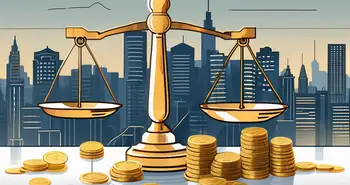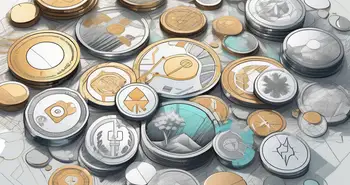Article Contents
The Future of Real Estate: Exploring Real Estate Tokenized Assets

Real estate has long been considered a solid investment, providing individuals and organizations with a tangible asset that appreciates over time. However, with the advent of blockchain technology and the rise of tokenized assets, the future of real estate is undergoing a revolutionary transformation. In this article, we will delve into the world of tokenized assets, explore its implications for the real estate industry, and discuss the potential benefits and challenges it presents.
Understanding Tokenized Assets
What are Tokenized Assets?
Tokenized assets are digital representations of real-world assets, such as real estate properties, that are stored and managed on a blockchain. Each token represents a portion of the underlying asset, granting its holder the right to various benefits, such as dividends, rental income, or capital appreciation.
Tokenization enables fractional ownership, allowing investors to buy and sell smaller portions of properties, making real estate investment more accessible to a wider range of individuals. By breaking down properties into tokens, it opens up opportunities for people to diversify their investment portfolio without requiring a large amount of capital.
Moreover, tokenized assets offer increased transparency and security compared to traditional investment methods. The immutability of blockchain technology ensures that ownership records are tamper-proof, reducing the risk of fraud and enhancing trust among investors.
The Technology Behind Tokenization
Blockchain technology serves as the foundation for the tokenization of assets. Blockchain allows for the secure and transparent recording of transactions, ensuring that the ownership of tokens is accurately maintained and verified without the need for intermediaries. Smart contracts, self-executing contracts with the terms of the agreement directly written into code, are used to automate processes and ensure compliance with predefined rules.
Through tokenization, real estate assets can be digitized, allowing for seamless transfer of ownership, efficient management of rental income, and enhanced liquidity in the market.
Furthermore, the use of blockchain technology in tokenizing assets also introduces the concept of programmable ownership. This means that token holders can participate in governance decisions related to the asset, such as voting on property management strategies or proposed upgrades. This level of direct engagement empowers investors and fosters a sense of community within the tokenized asset ecosystem.
The Intersection of Real Estate and Tokenization
Benefits of Tokenizing Real Estate
Tokenization offers numerous benefits for real estate investors and industry participants. Firstly, it provides increased liquidity, as tokens can be easily bought and sold on digital exchanges, eliminating the need for traditional lengthy and complex real estate transactions.
Additionally, tokenization allows for greater transparency and reduced transaction costs. By utilizing blockchain technology, ownership records and transactions are permanently recorded and accessible to all participants. This transparency mitigates the risk of fraud and provides individuals with a clearer understanding of the value and history of the asset.
Moreover, tokenization enables fractional ownership, opening up investment opportunities to a broader range of individuals, including retail investors. It democratizes real estate investment, allowing people to become part owners of high-value properties that were previously out of their reach.
Potential Challenges in Real Estate Tokenization
While the potential benefits of real estate tokenization are substantial, there are also challenges associated with its implementation. Firstly, regulatory frameworks surrounding tokenized assets are still developing. Different jurisdictions have varying approaches to the treatment of digital assets, and it is crucial for participants to comply with applicable regulations to ensure legal certainty and investor protection.
Furthermore, the nascent nature of the technology means that potential technical issues may arise. The security of blockchain networks and smart contracts must be robust to prevent hacking or manipulation. Ongoing advancements in security protocols and regulatory frameworks are necessary to build trust in the tokenization of real estate.
Expanding on the benefits of tokenizing real estate, increased liquidity not only benefits individual investors but also contributes to the overall efficiency of the real estate market. With tokens being easily traded on digital exchanges, the process of buying and selling properties becomes faster and more streamlined. This speed and efficiency can attract more investors to the market, leading to increased activity and potentially higher property values.
Moreover, the transparency provided by tokenization can have a positive impact on the due diligence process. Prospective investors can access detailed information about the property, including its history, current condition, and any potential issues. This level of transparency empowers investors to make more informed decisions and reduces the likelihood of unexpected surprises or hidden problems.
On the other hand, the challenges associated with real estate tokenization should not be overlooked. In addition to regulatory concerns, there is also the issue of market acceptance. While the concept of tokenization is gaining traction, there are still skeptics who question its long-term viability and potential risks. Overcoming these doubts and building trust in the market will require education and collaboration among industry participants, regulators, and investors.
Furthermore, the technical aspects of implementing real estate tokenization can be complex. Developing secure blockchain networks and smart contracts requires expertise in both real estate and technology. Collaboration between real estate professionals and blockchain developers is essential to ensure that the tokenization process is reliable, efficient, and resistant to potential vulnerabilities.
In conclusion, tokenization has the potential to revolutionize the real estate industry by increasing liquidity, transparency, and accessibility. However, it is important to address the challenges associated with regulatory frameworks, market acceptance, and technical implementation to fully harness the benefits of this innovative approach. As the intersection of real estate and tokenization continues to evolve, it will be fascinating to witness the transformative impact it can have on the way we invest in and interact with real estate assets.
The Impact of Tokenization on Real Estate Transactions
Simplifying Real Estate Transactions
Tokenization streamlines real estate transactions by removing the need for intermediaries and reducing paperwork. With fractional ownership, individuals can invest in properties located anywhere in the world without the logistical and administrative burdens traditionally associated with real estate transactions.
Smart contracts automate processes such as property transfer, rental income distribution, and dividend payments. This automation reduces the administrative overhead and potential for human error, resulting in faster and more efficient transactions.
Enhancing Liquidity in Real Estate
Historically, real estate has been an illiquid asset class, making it difficult to buy or sell properties quickly. With tokenization, real estate assets become more liquid, as tokens can be traded on digital exchanges, enabling investors to buy or sell their holdings at any time without having to find a buyer for the entire property.
This increased liquidity not only benefits investors looking for quick access to capital, but it also presents a new avenue for diversification for those seeking to balance their investment portfolio with tangible assets.
Regulatory Considerations for Tokenized Real Estate
Current Regulatory Landscape
The regulatory landscape surrounding tokenized real estate varies across jurisdictions. Some countries have embraced the technology and established clear guidelines, while others are still in the process of defining the legal framework.
Market participants must navigate these regulations and seek legal advice to ensure compliance. In doing so, they can build trust among investors and facilitate the widespread adoption of tokenized assets in the real estate sector.
Future Regulatory Predictions
As tokenized assets continue to gain traction, it is expected that regulatory frameworks will become more defined and comprehensive. The involvement of governments and regulatory bodies in shaping the development of tokenized real estate will provide clarity and stability to the market, fostering investor confidence and encouraging wider adoption.
However, achieving regulatory consensus at a global level may take time as different jurisdictions grapple with the legal and practical challenges posed by tokenization. Collaboration between industry participants, regulators, and policymakers is crucial to ensure the responsible and sustainable growth of the tokenized real estate market.
The Role of Blockchain in Real Estate Tokenization
How Blockchain Supports Tokenization
Blockchain technology plays a pivotal role in enabling real estate tokenization. Its decentralized nature ensures the secure recording and verification of ownership, eliminating the need for intermediaries such as brokers and title companies.
By utilizing blockchain, tokenized assets benefit from enhanced security, as the data stored on the network is immutable and resistant to alteration. This transparency and security instill confidence in investors and reduce the risk of fraud or disputes regarding ownership.
Security and Transparency in Blockchain
Blockchain offers a higher level of security in real estate transactions by providing a tamper-proof and auditable record of ownership and transactions. This transparency is essential for building trust among stakeholders, as it enables individuals to verify the provenance and history of an asset in a reliable and efficient manner.
Through blockchain, the real estate industry can overcome longstanding challenges and embrace a more efficient, secure, and transparent way of transacting and managing real estate assets.
As an expert in blockchain and real estate, I have witnessed firsthand the transformative potential of tokenized assets. I have advised numerous investors, developers, and industry players on the benefits and challenges of implementing tokenization strategies in the ever-evolving real estate market.
If you are considering venturing into the world of tokenized real estate, my advice would be to thoroughly research the regulatory landscape of your jurisdiction and seek guidance from legal and blockchain experts. Understanding the applicable regulations and having a clear roadmap for compliance is crucial to ensure a smooth and successful integration of tokenized assets into your investment portfolio.
FAQ: Exploring Tokenized Assets and Real Estate
What are tokenized assets?
Tokenized assets are digital representations of real-world assets, such as real estate properties, stored and managed on a blockchain. They enable fractional ownership and offer various benefits to investors.
How does tokenization benefit real estate investors?
Tokenization provides increased liquidity, transparency, and accessibility in real estate investment. It allows for fractional ownership, reducing the barriers to entry and enabling investors to diversify their portfolios more easily.
What are the challenges associated with real estate tokenization?
Regulatory frameworks are still developing, and technical security aspects must be addressed. Compliance with regulations and ensuring the robustness of blockchain networks and smart contracts are essential for the successful implementation of tokenized real estate.
How does blockchain support real estate tokenization?
Blockchain technology enables secure and transparent recording and verification of ownership, eliminating the need for intermediaries. Its decentralized nature enhances security, while the immutability of blockchain records fosters trust among participants.
What is the future outlook for tokenized real estate?
As regulations become more defined and comprehensive, and technological advancements continue to strengthen security and efficiency, tokenized real estate is expected to experience wider adoption. Collaboration between industry participants and regulators will play a crucial role in shaping the future of this emerging market.
In conclusion, tokenized assets are revolutionizing the real estate industry, offering new opportunities for investors, improving liquidity, and enhancing transparency. However, this transformative shift also brings forth challenges related to regulation and security. By embracing blockchain technology and working together to establish clear regulatory frameworks, the future of real estate holds immense potential, open to a broader range of participants, and paving the way for a more inclusive and efficient industry.
As we embrace the future of tokenized real estate and the myriad of opportunities it presents, consider taking your investment strategy to the next level with Morpher. Our revolutionary trading platform is at the forefront of utilizing blockchain technology to democratize trading across a multitude of asset classes. With Morpher, you can effortlessly step into the world of real estate tokenization, enjoying benefits like zero fees, infinite liquidity, and the ability to invest fractionally or even short sell without interest fees. Experience the safety and control of our non-custodial Morpher Wallet, and if you're looking to expand your trading power, leverage up to 10x on your trades. Join us at Morpher.com for a unique trading experience that aligns perfectly with the innovative spirit of tokenized assets. Sign Up and Get Your Free Sign Up Bonus today, and be part of the future of investing.

Disclaimer: All investments involve risk, and the past performance of a security, industry, sector, market, financial product, trading strategy, or individual’s trading does not guarantee future results or returns. Investors are fully responsible for any investment decisions they make. Such decisions should be based solely on an evaluation of their financial circumstances, investment objectives, risk tolerance, and liquidity needs. This post does not constitute investment advice.

Painless trading for everyone
Hundreds of markets all in one place - Apple, Bitcoin, Gold, Watches, NFTs, Sneakers and so much more.

Painless trading for everyone
Hundreds of markets all in one place - Apple, Bitcoin, Gold, Watches, NFTs, Sneakers and so much more.









